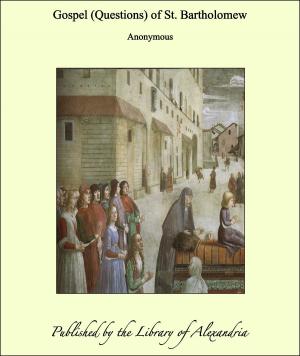Superstition in Medicine
Nonfiction, Religion & Spirituality, New Age, History, Fiction & Literature| Author: | Hugo Magnus | ISBN: | 9781465601803 |
| Publisher: | Library of Alexandria | Publication: | March 8, 2015 |
| Imprint: | Language: | English |
| Author: | Hugo Magnus |
| ISBN: | 9781465601803 |
| Publisher: | Library of Alexandria |
| Publication: | March 8, 2015 |
| Imprint: | |
| Language: | English |
Faith and superstition are twin brothers. Altho the former leads humanity to its sublimest ideals and the latter only presents us with a caricature of human knowledge, both are children of the same family. Both originate in a sense of the inadequacy of human science in regard to natural phenomena. The fact that the most important processes of organic life can not be traced to their ultimate origin, but that their investigation will soon lead to a point of irresistible opposition to further analysis, has always called forth a feeling of impotency and dependence in the human mind. This consciousness of being dependent upon factors which are entirely beyond human understanding has thus given rise to the metaphysical need of reflecting upon these mysterious factors, and bringing them within reach of human comprehension. Humanity, in attempting to satisfy such a metaphysical requirement from an ethical standpoint, created faith, which subsequently found expression in the various forms of religion. It is not within the scope of this essay to consider how far Divine revelations have been vouchsafed on this subject. Superstition undoubtedly entered the scene when, simultaneously with these, endeavors were made to consider and to explain physical processes from the standpoint of such metaphysical requirements. It is true that this did not, at first, lead to a marked contrast between faith and superstition; for a period existed in which faith and superstition—i.e., the metaphysical consideration of ethical values and the metaphysical consideration of the entire phenomena of life—were not only equivalent, but even merged into one conception. This occurred in an age in which mankind considered all terrestrial processes, whether they were of a psychical or of a material nature, as immediately caused by the steady interference of supernatural powers—a period during which the deity was held responsible for all terrestrial phenomena.
Faith and superstition are twin brothers. Altho the former leads humanity to its sublimest ideals and the latter only presents us with a caricature of human knowledge, both are children of the same family. Both originate in a sense of the inadequacy of human science in regard to natural phenomena. The fact that the most important processes of organic life can not be traced to their ultimate origin, but that their investigation will soon lead to a point of irresistible opposition to further analysis, has always called forth a feeling of impotency and dependence in the human mind. This consciousness of being dependent upon factors which are entirely beyond human understanding has thus given rise to the metaphysical need of reflecting upon these mysterious factors, and bringing them within reach of human comprehension. Humanity, in attempting to satisfy such a metaphysical requirement from an ethical standpoint, created faith, which subsequently found expression in the various forms of religion. It is not within the scope of this essay to consider how far Divine revelations have been vouchsafed on this subject. Superstition undoubtedly entered the scene when, simultaneously with these, endeavors were made to consider and to explain physical processes from the standpoint of such metaphysical requirements. It is true that this did not, at first, lead to a marked contrast between faith and superstition; for a period existed in which faith and superstition—i.e., the metaphysical consideration of ethical values and the metaphysical consideration of the entire phenomena of life—were not only equivalent, but even merged into one conception. This occurred in an age in which mankind considered all terrestrial processes, whether they were of a psychical or of a material nature, as immediately caused by the steady interference of supernatural powers—a period during which the deity was held responsible for all terrestrial phenomena.















